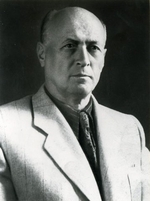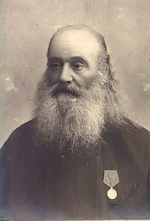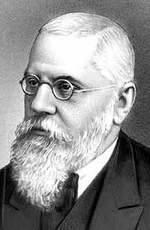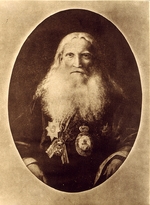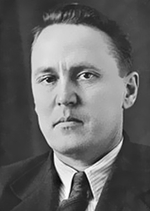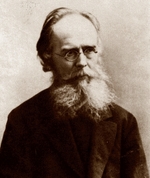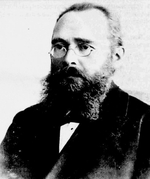Articles
Plisetsky Mark (1891–1957)
Plisetsky Mark (1891–1957) – anthropologist, ethnographer and historian of religion.
Since 1919, he was at the Party work. In 1924, he became Head of the State Central Publishing House of the peoples of the U.S.S.R. at the Presidium of All-Union Central Executive Committee. Since 1927, he worked at the State Central Museum of Ethnography (Moscow). In 1931-1957, he was Director of the research Institute of Anthropology, and at the Museum of Anthropology at the Moscow State University. In 1932-1937, he was Chief Editor of the “Anthropological Magazine’. Candidate in History (1932), Docent.
Read More
Podgorbunsky Innokenty (1862–1913)
Podgorbunsky Innokenty (1862–1913) – priest, missionary, teacher of Buryati and Mongolian languages at the Irkutsk Spiritual Seminary, specialist in Mongolian studies, translator, researcher of Buryat Buddhism, Shamanism, folklore and speaking language of Mongolian peoples, editor of ‘Irkutskie eparkhial’nye vedomosti’ (The Irkutsk Eparchy Herald), photographer.
In 1878, he graduated from the Nerchinsk Spiritual School; in 1884 – from the Irkuts Spiritual Seminary; in 1884-1888, he studied at the Kazan’ Spiritual Academy, where he got the Candidate degree in Theology for his composition ‘The Moral Doctrine of Buddhism According the Mongolian Book Uliger-und-dalay, with Russian Translations Supplied’.
Read More
Pokrovsky Aleksander (1893–1944)
Pokrovsky Aleksander (1893–1944) – historian.
In 1912, he finished the Borisoglebskaya Aleksandrovskaya Gymnasium and enrolled at the Historical Department of the Historical and Philological Faculty of the St. Petersburg University; he graduated from it in October 1917. Additionally, he passed through exams on the position of teacher of history. From the autumn 1917 till March 1935, he taught at several secondary schools of Petrograd/Leningrad.
He taught at the Petrograd State University from November 9, 1917 till October 1, 1924; in 1924-1929, he worked at various institutions – made lectures and research in the field of social studies.
Read More
Pokrovsky Mikhail (1868–1932)
Pokrovsky Mikhail (1868–1932) – historian.
He was in the family of State Council; in 1891, he graduated from the Historical and Philological Faculty of the Moscow University. After it he stayed at the University to prepare himself for the Professor position – at two Chairs at once: that of Russian and World History. He participated in the December armed uprising in Moscow in 1905. In 1906, V. I. Lenin invited him to work at the ‘Proletary’ Newspaper. In October 1906, he participated in the election campaign for the State Duma II. He was also a delegate of the V (London) Congress of the R.S.D.W.P. (b) (1907), where he was elected for Candidate to Member of the Central Committee.
Read More
Popov Mikhail (1742 ‒ nr.1790)
Popov Mikhail (1742 ‒ nr.1790) – writer, translator, folklorist.
Disciple of the founder of the Russian Drama theatre F. G. Volkov. Since 1765, he studied at the Moscow University; worked as Secretary of the Commission for Composing a Project of the New Ulozjenie (Code). In 1769, he got the lowest official rank of Collegiate Registrar; in 1776, he became District Secretary (two step higher rank).
He translated ‘The Adventures of Telemachus’ by Fenelon (under the title ‘Aristonoevy prikliucheniya’), ‘Le Barbier de Seville’ by Beaumarchais, ‘Gerusalemme Liberata’ by Tasso, Voltaire’s fables, and Persian fairy-tales from French into Russian. In 1770-1774, together with M. D. Chulkov, he prepared and published several issues of folk songs.
Read More
Porphyry (Constantine Uspensky) (1804‒1885)
Porphyry (Constantine Uspensky) (1804‒1885) – orientalist, archeographer, archeologist, specialist in Byzantine studies.
He was born in the family of a small clergyman; in 1813-1818, he studied at the Kostroma Spiritual School; and in 1818-1824 – at the Kostroma Spiritual Seminary. In 1829, he graduated from the St. Petersburg Spiritual Academy, and the same year he became a monk, taking the name of Porphyry; soon he became archpriest.
In 1831, he became Master in Theology, and teacher of Ecclesiastic Law at the Rishelievsky Lyceum in Odessa.
Read More
Potapov Leonid (1905–2000)
Potapov Leonid (1905–2000) – ethnographer, specialist in language and culture of Altai, Tuva and Shoria peoples.
He graduated from the Ethnographical Department of the Geographical Faculty of the Leningrad State University (1928); he worked with the ethnographical group of the Altai Expedition of the Commission on Studying the Tribal Structure of the Population of the U.S.S.R. (1927); in 1928-1930, he worked in Uzbekistan. Since 1930, he was at the post-graduate courses of the Ac. of Sc. of the U.S.S.R. in ethnography.
In 1939, he defended his Candidate thesis ‘The Remains of the Primordial System of the Peoples of Altai’. Before the WWII, he became Head of the Department of Siberia, and of the ethnographical part of the State Museum of Ethnography of the peoples of the U.S.S.R. He was also Researcher at the Institute of the History of Material Culture of the Ac. of Sc. of the U.S.S.R. In 1942, he was evacuated to Novosibirsk, then he moved to Barnaul, where he taught at the Gorno-Altaisky Teachers-Training Institute.
Read More
Potebnya Aleksander (1835‒1891)
Potebnya Aleksander (1835‒1891) – philologist.
In 1856, he graduated from the Historical and Philological Faculty of the Kharkov University; later, he built his own research school of linguists in Kharkov.
For a short time, he had worked as gymnasium teacher of literature; in 1861, he defended his Master thesis ‘On Some Symbols in Slavic Folk Poetry’ and started teaching at the University. In 1862, he went abroad and visited lectures at the University of Berlin, studied Sanskrit, travelled. In 1874, he defended hid Doctor thesis ‘From the Notes on Russian Grammar’. Since 1875, he was Professor of the Kharkov University.
Read More
Pozdneev Aleksay (1851‒1920)
Pozdneev Aleksay (1851‒1920) – orientalist, specialist in Mongol studies, religious historian, ethnographer, folklorist, philologist, traveler.
He studied at the Orlovsky Spiritual Seminary (1872), and at the Faculty of Oriental Languages of the St. Petersburg University. Since 1881, he was Professor of the St. Petersburg University; in1899-1903, he was the first Director of the Oriental Institute in Vladivostok; since 1903, he was a member of the Council at the Minister of People’s Education.
Having graduated from the Oriental Faculty of the St. Petersburg University, in 1876, he took part in his first expedition to Mongolia and China, in the course of which he collected Mongolian manuscripts and prints for the library of the Oriental Faculty, and also laid the foundation of his private collection of Buddhist art.
Read More
Preobrazhensky Peter (1894–1941)
Preobrazhensky Peter (1894–1941) – ethnologist, historian of religion.
He was born in the family of a priest; he was a grandson of P. A. Preobrazhensky, translator of Early Christian texts, and Editor of the ‘Pravoslavnoe obozrenie’ (Orthodox Review) Magazine. In 1905, P. left his father; he learnt at the Moscow the Medvednikovs Gymnasium, and finished it with the golden medal in 1912. He enrolled to the Historical and Philological Faculty of the Moscow University; after its graduation in 1916, he stayed at the Chair of the World History to prepare for the Professor position under the supervision of Professor R. Yu. Wipper. In 1916-1919, he was Ass. Docent of the Historical and Philological Faculty of the Moscow University. In 1919, he became Professor of the University of Samara (opened a year earlier) at the Chair of the Western History.
Read More
Showing 221-230 of 351 items.

